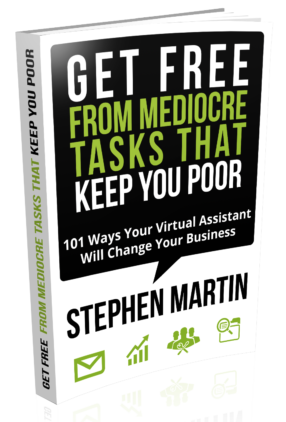Virtual Assistant Blog

A Case Study For Using A Virtual Assistant
Kia Ora!
I just finished playing football with a few mates earlier, and I thought i should share something with all of you. I learned that one of my mates is still working 12 hours a day or so – this is the first time we have been able to play with him in over a month! We hardly have time to hang out with him anymore; in fact, when we saw him in the field earlier we all thought he was an apparition!
Okay, so maybe I’m just exaggerating that last part, but the time he spends per day trying to dig in and make his business successful, only to still end up short on free time and energy is actually true. Let’s call him Billy just for the sake of this story. He works as a mortgage broker.
The funny thing is, I have another mate on the team – let’s call him Richie – who plays almost every day and has travelled the world with his wife. He’s also a mortgage broker!
Here now lies the curious case of two mortgage brokers: both equally successful, but one of them is obviously struggling with his time and is living quite miserably (sorry for the term!).

Let’s look at their lives from four different angles:
1. Micromanagement versus Delegation
Billy is quite an extraordinary manager. He knows his business inside and out. He also knows his one secretary’s tasks. (By the way, she is Billy’s fourth secretary this year…and it’s only been 6 months!!). However, he is extraordinarily asking for updates every few minutes, giving instructions up to the last ink of each document, and measuring productivity down to the last second.
He’s a good manager – but is he being a great leader? Despite his extraordinary (and I keep on saying this, I know) management style, he has lost great staff one after the other. He eventually gave up hiring more staff altogether. He even lost 2 great mortgage broker admin staff earlier this year, and never even considered replacing them.
Richie, on the other hand, is a great delegator. He assigns tasks to his team, and follows-up when needed. His staff are quite happy with his style, and he actually has more clients than Billy. He has more revenue, a very happy workforce, and an excellent client portfolio.
2. Staff Builder versus Team Builder
Billy is a great staff builder. He knows where to get the staff he wants to have, and how to build great remuneration packages. But, he never keeps them for long.
Richie only hires by word of mouth – through referrals. He screens candidates, gives them a market-average remuneration, and they stay with him for years.
What’s the difference? Richie knows how to build great teams! He has two mortgage broker administration staff working for him 8 hours a day. They set-up appointments, manage his diary, reply to emails, follow-up on sales leads and client issues, build and manage reports – in short, they have successfully duplicated what Richie can do.
Billy has never been able to retain staff in his business, except for that one very patient secretary…
3. Accountability versus Trust
Billy would often say things like, “I want you to do this report within the week and I will hold you accountable.”
Richie, however, would often ask his staff, “Do you think you can do this within the week? If you can, then I trust that you will do an excellent job at it.”
While accountability is needed in every business, holding someone accountable and trusting them to do it are two entirely different things. They both result to about the same output, and expectations are essentially the same, but the manner in which the goals, objectives, and expectations are delivered are quite different.
In short, it becomes trust which differentiates the two outcomes. Business improves when you bestow trust to the right people.
Trusting the wrong people gets you into trouble!
Because of Richie’s delegation style, he was able to assign tasks and due to his training methods, trust that they would be done correctly. Billy, on the other hand, micromanaged to the point that he was essentially doing the job himself — despite paying others to do it! — but nobody was learning how to do it the right way on their own, though he would still hold them accountable nevertheless.
This brings me to the last point.
4. Vendors versus Business Partners
We already know that Billy has a tremendous trust issue with almost everyone – so much so that he will investigate every single inch of a minor anomaly he finds, as well as invest a great deal into micromanaging because he does not trust his team to handle tasks accurately, This not only consumes a massive amount of time, it also drains him emotionally, physically, and financially.
Richie does not trust everyone, but he knows who to trust. He initially started his business with one great mortgage broker administrator that works remotely from another country. He put in a good amount of time to train and coach this staff, and after about a month or two, this staff member was able to handle everything Richie was formerly doing on his own — and more!
Eventually Richie got another mortgage broker administrator. Now, his first staff trained this incoming staff – and now he has two more of himself! There is now 2x more productivity, 2x the free time added to his personal life, and 2x more earnings for him!
Richie knows the difference between vendors and business partners. He knows who to talk to when he needs something, and he knows that his business partners will deliver when he is expecting them to.
Poor Billy is still expecting his “vendors” to perform for him, but without the training and trust needed to become effective team members — business partners — his team was failing.
Now that you know the difference between the two, I would like to let you know that Richie’s methods actually work! He has been able to duplicate himself (or rather triplicate!) for a cost that is more than 50% lower than what it would actually cost to pay himself or another staff in New Zealand.
It’s up to you to which strategy you would like to emulate. Outsourcing is not an overnight success; it means launching partnerships with the right people in order to achieve the results you want, and building great relationships with the partners who will stick with you for the long haul.

These are just the Top 10 tasks Virtual Assistants can perform for property managers. Want more?
Grab a FREE digital copy of our latest book which gives you 101 Ways Your Virtual Assistant Will Change Your Business.

How much will I pay each month?
Virtual Assistants range from $4 – $12 per hour but it depends on what you want them to do. Get a 100% FREE customised Salary report by answering a few quick questions.
Virtual Staff hires really amazing assistants based in the Philippines. These virtual assistants are loyal, caring & have great work ethics. We are a Kiwi owned company based in Auckland New Zealand with team members in Australia & The Philippines.
We are a subsidiary of Virtual Innovation Group Limited.
© Copyright 2023 - Virtual Innovation Group Limited T/A Virtual Staff. All Rights Reserved

